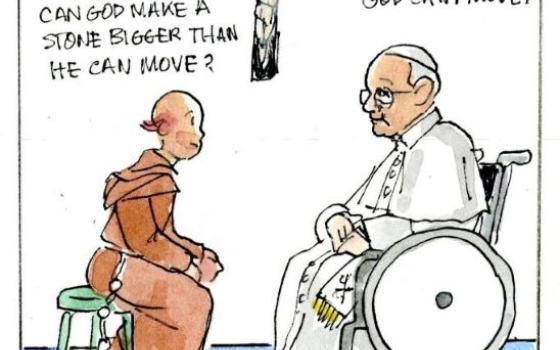
Daniel Markham prays during Mass at St. Michael Catholic Church in St. Michael, Minnesota, June 13, 2021, during his "52 Masses" tour. (CNS/The Catholic Spirit/Dave Hrbacek)

After dropping his youngest son off at soccer practice one day, Daniel Markham happened to remember a nearby church he'd occasionally attended inside the Indiana Dunes National Park near Michigan City, Indiana. And just like that, the idea of attending 52 Masses in all 50 states, plus the District of Columbia and Puerto Rico, over the course of a year "washed over me," he writes in his vibrant, well-reported new book, 52 Masses: A Journey to Experience Catholicism Across America.
Markham thought he could accomplish the feat in 2021, but COVID-19 had other ideas. Though it took longer than expected, the result is a fascinating quilt of experiences that has surprisingly little to do with liturgical differences but rather paints an inspiring picture of what American Catholicism looks like today.
Further, it describes parish ministries that work and that can be adopted (and adapted) by others to help revive struggling congregations around the country.
It won't matter much whether churches seeking to draw help from this book think of themselves as pre-Vatican II in their theological conservatism, radically progressive in their focus on social justice issues, or something in between. The range of parishes Markham visited is wide enough to offer helpful ministry ideas to all.
The author doesn't directly describe where he fits on the theological spectrum of American Catholicism, though it's clear that racial justice is important to him just as it's clear where he stands on abortion.
In his description of a Mass he attended at St. Gianna's Maternity Home in Warsaw, North Dakota, for example, he tells of pregnant women who come there "alone, often fighting the forces that encourage them to take the easy, sinful way out." The adjective "sinful" is telling.
But beyond the infrequent insertion of his personal views, Markham is mostly a cheerleader for congregations that have figured out how to meet the needs of parishioners in an extraordinary variety of settings.
Advertisement
Readers, for instance, will learn about volunteers in Dexter, Michigan, overseeing traveling disaster-assistance teams of youth in such places as St. Bernard Parish in New Orleans after Hurricane Katrina. In Salt Lake City, Markham describes how a Catholic graduate student learns to maintain and share her faith in a culture dominated by the Church of Jesus Christ of Latter-day Saints.
In Bakersfield, California, Markham writes about compassionate ministry to women who have experienced a miscarriage. In Newtown, Connecticut, he describes Catholics who help families find a way of living generatively after losing children in the 2012 mass shooting at Sandy Hook Elementary School. And in Washington, D.C., Markham introduces readers to a parish that responded to the clerical sexual abuse scandal by helping people know what to do if they suspect abuse.
Readers seeking detailed descriptions of 52 different Masses may be disappointed, but what they get instead is much more valuable.
Indeed, Markham, in the final chapter, admits that "the book's title is a lie. 52 Masses is both too many Masses and too few."
Too many, he writes, because a couple of the Masses he attended were at Eastern churches in full communion with the Vatican. There, Masses are called "the Divine Liturgy." And it was too few because, in fact, sometimes he attended two or three Masses at each stop.
Importantly, his focus was not on worship styles but active ministry — often outside the walls of the church.
His year-plus of weekends on the road, he writes, "managed to exceed even my ridiculously lofty expectations. The experience was remarkably enriching in so many ways. Obviously, and most prominently, my spiritual life grew exponentially. I feel closer to Christ than I ever have, and my connection to my Catholic faith has never been stronger."
"But the growth didn't end there. I was also stimulated emotionally and intellectually. I heard stories of pain and joy in equal measures, from men and women of devout faith. ... They took strength from their faith in Christ, and in turn inspired me to do likewise in all my life's occurrences."
Before this experience, Markham acknowledges, "I was a pretty lumpy piece of clay, catechistically speaking."
Peregrino Press gets a couple of demerits for not including a table of contents in this book so that readers could quickly get a list of parishes that Markham visited. If there is a next edition, that should be added.
As for the writing itself, Markham communicates with clarity and insight, but in a pedestrian style lacking in the kind of brilliant wordsmithing that tends to wow readers. And yet perhaps that is just as well in a book of this kind, where sentences as ornate as Cleopatra's necklaces would distract readers from the point itself: American Catholicism is a wide experience, and we can learn from all of it.







